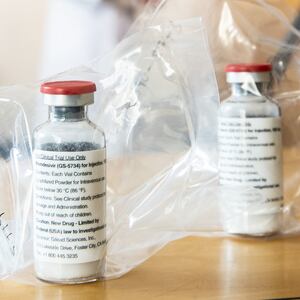Since the pandemic began, scientists have crawled through a back catalog of dozens of medications in a quest to find one that might have some effect against COVID-19 infections. These investigations have largely ended in frustration. The only drug that’s approved by the FDA to treat COVID-19 patients so far is remdesivir. Most others have shown limited or no efficacy and have drifted back into pharmaceutical obscurity. Others, like hydroxychloroquine and ivermectin, have found backers among anti-vaxxers and the far right, despite very alarming safety records.
But remdesivir might have some company soon. A new clinical trial shows that fluvoxamine—typically prescribed to treat depression, anxiety, and obsessive-compulsive disorder—shortened hospital stays for people battling severe COVID infections.
The findings, published in The Lancet Global Health on Wednesday)" href="https://urldefense.com/v3/__https:/www.thelancet.com/journals/langlo/article/PIIS2214-109X(21)00448-4/fulltext__;!!LsXw!FK8JMUICaM-V5taRltXItEdBw_Xz67j3IcG3XLkyWuHD4llP68nEg9yOXzfdyaproY_LT28$">published in The Lancet Global Health on Wednesday, could be a huge breakthrough to save patient lives and shorten the recovery from COVID—not least because fluvoxamine is incredibly cheap and can be administered orally.
“Scientifically and medically, I think this treatment should be now considered as a serious therapeutic option to reduce risks of hospitalization and death among patients with COVID, particularly in low-resource countries that have no other means to face the pandemic,” Nicolas Hoertel, a psychiatrist at the University of Paris who was not involved with the study, told The Daily Beast. “This treatment is safe, well-tolerated, inexpensive, easy to use, and with a high level of evidence of strong efficacy. This could be a potential game changer along with the vaccines.”
Fluvoxamine was first introduced to the world in 1983, and has been FDA-approved since 1994. It’s a selective serotonin reuptake inhibitor, or SSRI. Unlike remdesivir, it does not have any obvious anti-viral properties. Edward Mills, a co-author of the new study based at McMaster University in Canada, told The Daily Beast the effects are most likely anti-inflammatory)" href="https://urldefense.com/v3/__https://www.frontiersin.org/articles/10.3389/fphar.2021.652688/full__;!!LsXw!DBl3LfOoTQIl3iqnZhDCeFMinvyMWQky_yBg25lizIbtG5MTIsZ9qDura7f27bL1gu-wEg$">most likely anti-inflammatory.
This is key, because in many severe cases of COVID, it isn’t the virus that kills—it’s the body’s own immune response going into hyperdrive and unleashing itself on healthy cells and tissue, at an incredibly rapid pace.
To see if fluvoxamine could dampen this storm of inflammation, Mills and his colleagues first tested it in a small clinical trial last year and found that fluvoxamine appeared to prevent severe COVID progression when patients were treated early. Those results were published in JAMA in November 2020. A parallel study run by Hoertel and other French researchers also found that hospitalized COVID patients who were prescribed fluvoxamine had a lower risk of being intubated or dying.
This led to fluvoxamine’s selection for the TOGETHER trial—the largest double-blind, randomized clinical trial to date to study the efficacy of eight pre-existing drugs against COVID-19. The fluvoxamine arm of the trial began in January 2021 and involved giving the drug to 741 COVID-positive Brazilian adults who were unvaccinated and were deemed high-risk for severe infection. Another 756 COVID-positive participants were given a placebo.
Participants treated with fluvoxamine were 32 percent less likely to require more than six hours of hospitalization than their placebo counterparts, and saw a 5 percent overall reduction in risk of a prolonged hospitalization. Among patients who took at least 80 percent of their medication doses, there was only one death in the fluvoxamine group, compared to 12 in the placebo group.
David Boulware, an infectious disease specialist at the University of Minnesota who was not involved in the new study, told The Daily Beast he “absolutely” believes we could see the drug play a serious role against COVID almost immediately.
“It is an existing FDA-approved medicine that is available at probably every U.S. pharmacy and is available worldwide,” he said. The cost for a 10-day treatment course is about $10,” far lower than the cost of current COVID treatments like monoclonal antibodies. Though less effective, Boulware thinks fluvoxamine may be used as a complementary treatment to further improve outcomes.
Boulware does raise the issue of dosage—in the TOGETHER trial, about 25 percent were unable to tolerate 100 milligrams daily of fluvoxamine, and 15 percent were unable to tolerate the placebo (probably due to simply being sick with COVID). A 50 milligram dose is being studied in two U.S. trials, and he thinks it could have a better overall effect for patients.
The results may also encourage health experts to conscript other SSRIs to fight COVID. Not all operate with the same biochemistry as fluvoxamine, but one, called fluoxetine, is actually quite similar. Some early studies spearheaded by Hoertel have been encouraging. And unlike fluvoxamine, fluoxetine is already on the World Health Organization’s Model List of Essential Medicines.








